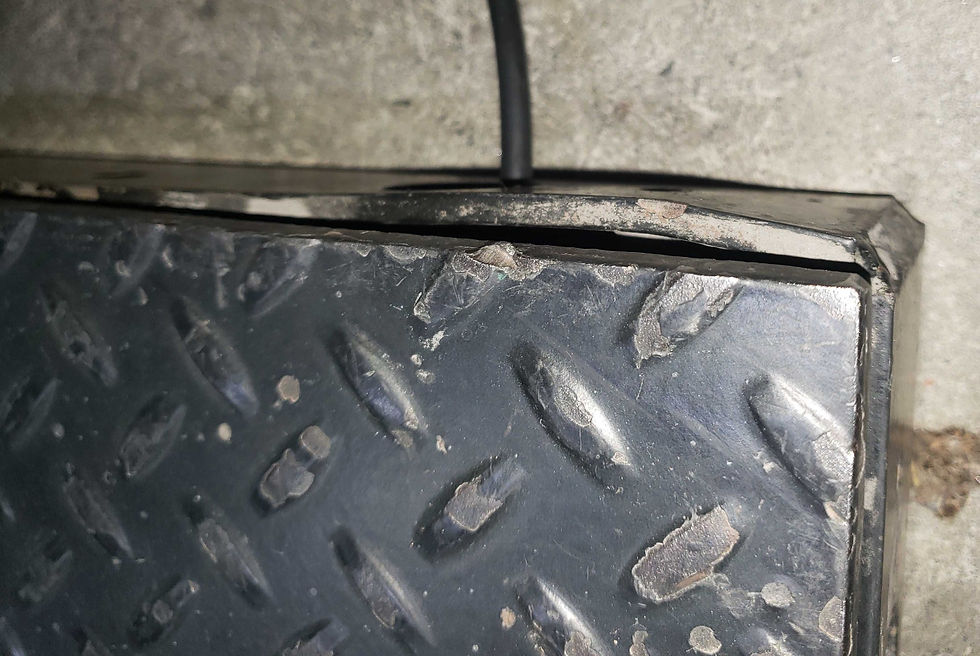Common Damages to Floor Scales
- Cech Corporation

- May 11, 2020
- 3 min read
Updated: May 22, 2020
Floor scales are one of the most commonly used types of weighing equipment. They are made popular by their versatility; Floor scales can be used to measure a wide weight range and many types of objects, both contained liquids and solids, from a bag of corn to a gondola full of stamped parts. This makes them an ideal scale for use in many robust manufacturing environments.
The most commonly used floor scale is a footed floor scale. These are scales that have four (4) circular or square feet screwed into the load cell below the scale. The feet and load cells allow the measuring of weight on the scale.
Because of the popularity of these scales, damages to them become more prevalent. However, there are preemptive measures that may be taken to protect floor scales. To learn more about protecting floor scales, click here.

How do floor scales get damaged?
How these scales get damaged varies by application, but here are the most common causes and how they can affect a scale:
Forklift damage - This is caused by forklifts coming in too low and bending a foot or the weighbridge itself. When this happens a scale may still show weight, but provides a false reading.
Improper moving processes like sliding a scale across the floor can cause damage to the feet and load cells of a scale. This happens because the foot of the load cell catches debris and snags on the floor. The scale may still show weight, but provides a false reading.
Scales may be pushed back against a wall, which can cut the cable connecting the scale base to the display terminal. This results in the scale losing power and the terminal not displaying any weight.
Shock loading is when a scale has a product or item dropped on it. The shock force, even if it’s less than the capacity of the scale, can damage the load cells. When this occurs a scale may still show weight correctly up to a certain point, beyond which the measurements are inaccurate.
Some scales are not made to withstand water, even a gradual drip can cause major problems. This means that the load cell is not a sealed design or the j-box that the cells sum into is not sealed or is left out in the open. A scale with water damage can also damage the scale controller due to electrical shortage. Condensation can also pose a threat to a floor scale without a tight seal by causing the scale to work during one part of the day and not the other.
Static electricity can wreak havoc on floor scales. The small spike from a static shock can take out a load cell, the scale terminal or both. Scales suffering from static shock may work for a short period, but the static will eventually take its toll and the scale will require repair. Static is something that should be considered before purchasing any scale.
Mechanical issues - These scenarios relate to poor scale design or mechanical damage to the scale structure itself. Debris pinch points can bind a load cell to the scale frame or metal can be bent that interferes with the freedom of the load cell to bend under load.
Scale damaged mechanically can weigh correctly until they get to a certain weight where the scale will bind and not function correctly beyond that point.
Neglecting to regularly service a scale can dramatically shorten a scale’s lifespan. Not servicing your scale regularly will shorten its life dramatically. Don’t skimp on keeping a scale in tip top shape with a good preventative maintenance program. Here are some common issues that need to be addressed:
Rocker pin scales require o-rings and pins to be serviced as they are wear parts.
The foot and lock nut can loosen and damage a cell.
Cord grips can come loose and allow debris to enter the electronics
Cable can get nicked or damaged and should be inspected and replaced as necessary before they become an issue.
Every one of these scenarios can cost valuable time and profit. In most instances, outside of a cut cable, you will be using the scale while it is broken not knowing that anything is wrong. This can be a huge issue from a quality standpoint.
If you are concerned that a scale may have one of these damages or would like to know more, please feel free to contact a Sales Representative. We are always here to help!
If you've enjoyed reading this, or would like some more information about scale installation, check out the rest of our website or our blog.
Here are some of our other posts that you might enjoy:






Comments